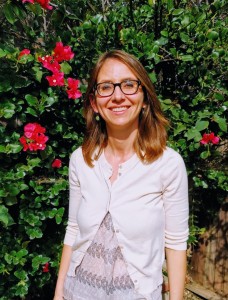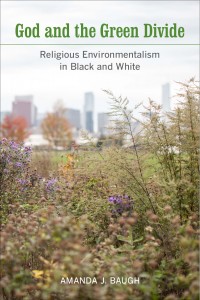Faith-Based Groups are Inspiring and Diversifying Environmentalism, CSUN Professor Says
As politicians in Washington D.C., rewrite and pull back federal environmental regulations, they may be surprised to discover that some of the loudest objections are coming from interfaith groups that cross racial and ethnic lines, according to Amanda Baugh, an assistant professor of religious studies at California State University, Northridge.

Amanda Baugh
Baugh, author of “God and the Green Divide: Religious Environmentalism in Black and White,” said people of faith are banding together across denominational lines to do what they can to protect the environmental health of the communities they live in.
“These groups appeal to their scriptures and faith traditions as they urge legislators to advance a biblical mandate to be good stewards of God’s creation,” Baugh said. “This type of religiously grounded environmental activism has become increasingly prevalent in the last decade, but the motivations inspiring religious communities to act are much more complicated than God wants us to ‘go green.’”
It’s that complexity that also is inspiring more people of color in efforts to work to protect the environment, Baugh said.
For years, Baugh said, environmentalism has been seen as a “white” issue concerned with “saving the whales.”
“Even today, if you look at mainstream environmental organizations, they continue to be mostly white, with activists focusing on saving the ‘wilderness,’” she said.
“Things started to change in the early 2000s,” she continued. “The release of [the documentary about global warming] ‘An Inconvenient Truth,’ was a turning point. It helped connect the environment as a real issue. People started to make the connections about what was happening around the them — the environmental degradation and its impact on human life.”
She noted that as early as the 1980s, studies documented examples of “environmental racism,” the disproportionate location of toxic waste sites, landfills and polluting industries in minority and poor communities.
“Because examples of environmental racism are so prevalent, people assume that minorities’ experiences with the environment are defined by environmental problems,” Baugh said. “But the reality is, minority communities care about the environment beyond what is happening in their backyards, and religious leaders recognize that a lot of that concern has a foundation in their faith and personal experiences.”
 Baugh spent several years studying Faith in Place, an interfaith environmental organization in Chicago. That research provided the foundation for her book, “God and the Green Divide,” which was published last fall by University of California Press.
Baugh spent several years studying Faith in Place, an interfaith environmental organization in Chicago. That research provided the foundation for her book, “God and the Green Divide,” which was published last fall by University of California Press.
Members of Faith in Place argued — as did several other religious leaders, including Pope Francis — that climate change is a moral issue that disproportionally affects the poor and, adhering to the tenets of their faiths, they have an obligation to respond appropriately.
“But Faith in Place participants also engaged in eco-friendly behaviors for other reasons,” Baugh said, citing the example of Veronica Kyle, director of the organization’s congregational outreach.
Kyle recruited more than 800 African-American protestants from Chicago’s South and West sides by focusing on topics other than social justice. Instead, she talked about positive relationships with nature and the economic opportunities that can come with involvement in mainstream environmentalism, including business opportunities created by the burgeoning “green” economy. Kyle encouraged the development of home vegetable gardens by pointing out that many African-Americans who grew up in the South often grew their own food or, as she put it, “used to eat local all the time.”
Kyle also developed programs to provide training and temporary employment in environmentally friendly industries and organic gardening projects, hoping alumni of those programs would turn their new skills into “green” careers.
“Kyle acknowledged the legacy and persistence of environmental racism,” Baugh said. “But she sought to move conversations beyond that singular focus, encouraging African-Americans to cultivate and celebrate positive experiences in nature instead of strictly combatting negative experiences.”
Now in Los Angeles, Baugh’s new research project focuses on the relationship Latino Catholics have with the environment. Although her research is still in its early stages, Baugh said she already is seeing indications that Latinos, particularly immigrants, have deep environmental convictions.
“Those beliefs grew from connections to their ancestral homelands and an understanding of nature as inseparable from God,” she said.
One person Baugh talked to put it simply: “As a Catholic, I believe that God and nature are one.”
Baugh said the African-American community she studied in Chicago and her work with the Latino community in Los Angeles challenge the generalization that theologically conservative groups tend not to prioritize environmental concerns.
“Such generalizations seem to rely on considerations of environmental values among high-profile, white evangelical leaders,” she said. “They assume mainstream, white ideas of what constitutes environmental activism.”
Baugh doesn’t know what her findings mean for federal environmental policy coming out of Washington, D.C., but, she said they do indicate that the larger conversation about the environment needs to be broader and more inclusive.

 experience
experience